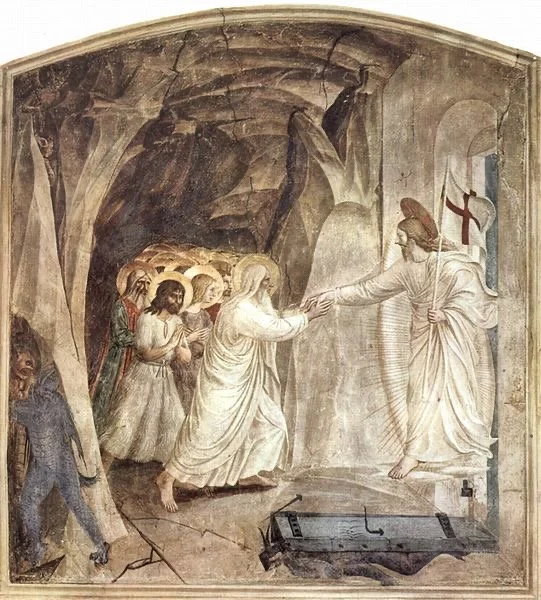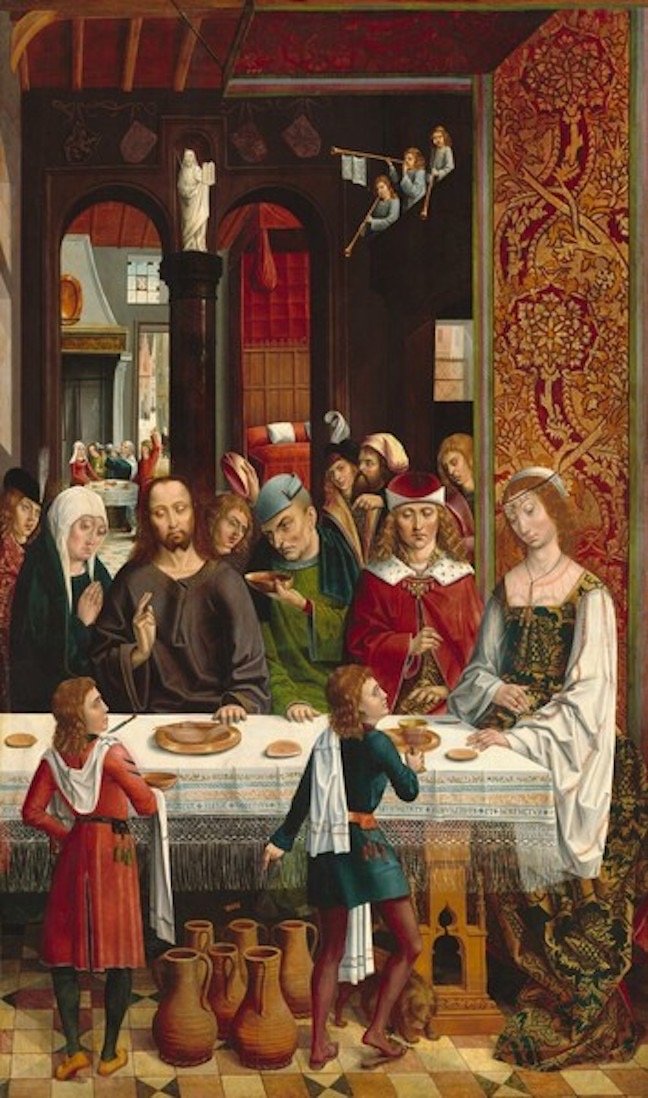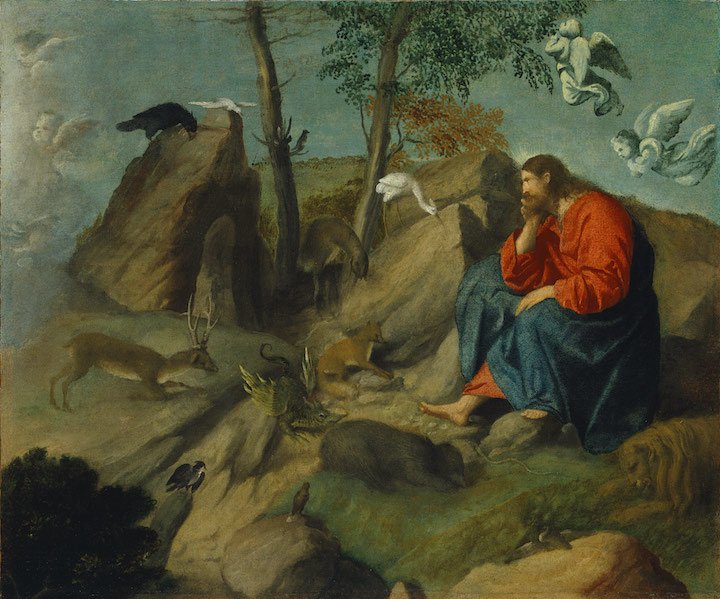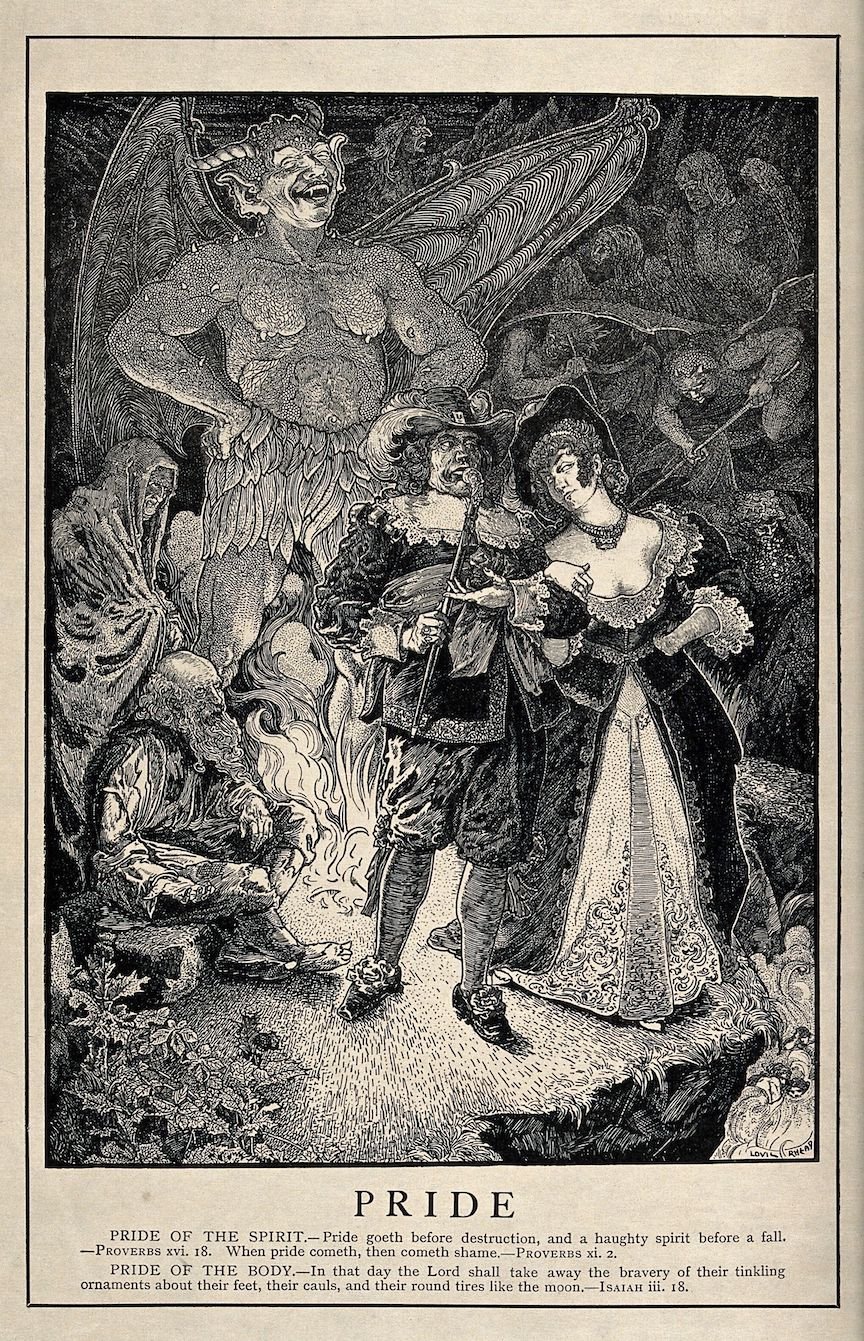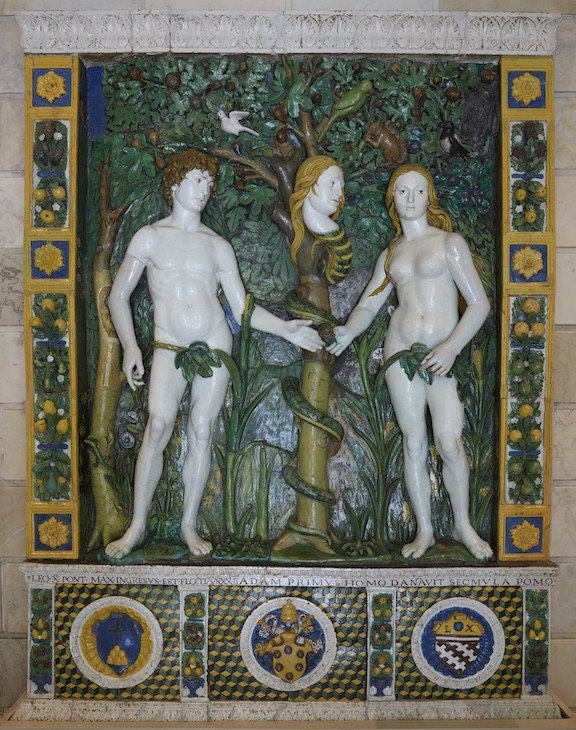Well, I thought I was done with following, but then I encounter a good image from a text on prayer; even better, as I was listening to the storm very early this morning an idea occurred to me regarding Flannery O’Connor that seemed worth following, so to speak. So far it will be called “Images and Endings.” The idea is to see how 4 FO’C characters understand Jesus in their own stories and then see where that understanding leads them. The 4 stories that immediately occurred to me are: A Good Man Is Hard to Find [the Misfit & the grandmother], Greenleaf [Mrs. May & Mrs. Greenleaf], Parker’s Back [O.E. Parker & his wife, Sarah Ruth], & A Temple of the Holy Ghost [the Child & the Hermaphrodite]. Depending on how this work unfolds, then perhaps these two as well: The Enduring Chill [Asbury & the Jesuit Priest], or Good Country People [Hulga Joy Hopewell & the satanic Bible Salesman]. The stories are all so good that I get excited just thinking about them again as their images roll around in my mind: The Bible salesman making off with Hulga’s wooden leg; the icicle descending on Asbury; the Hermaphrodite preaching in the tent; Parker’s tattoo of Jesus on his back; Mrs. May “embraced” by the Greenleaf bull; & the Misfit’s rejection of the grandmother’s gesture. While I was leaning toward A Good Man when I first thought about the idea, in remembering the stories just now, Parker’s Back seemed a better place to start .
O. E. Parker is a haunted man, a somewhat empty man who also feels that someone is after him. As a consequence of his emptiness and dissatisfaction, he fills his body with tattoos, searching for meaning in the numerous images of creation, from inanimate to animate; nothing, however, satisfies Parker, reminding me of St. Augustine’s familiar quote from the Confessions: “our hearts are restless till they rest in thee.” As a consequence of his emptiness Parker marries Sarah Ruth Cates, a strict Old Testament oriented legalist. “She was forever sniffing up sin.” Parker thinks he understands Sarah Ruth but what worries him is that he doesn’t understand himself. The narrator reveals Parker’s perspective throughout almost all of the story and describes the nature of the marriage: “This ugly woman Parker married was his first wife. He had had other women but he had planned never to get himself tied up legally.” The Old Testament images and details are pervasive as the “legally” in this quote reflects not only his marriage ties but also his ontological situation of dissatisfaction. Later in story we learn about the exchange of names and the OT grounding of the marriage. Parker hates his name uses only the initials, O. E. Sarah Ruth, however, makes him explain, which he does in a whisper. Sarah Ruth repeats what he whispered:
[“Obadiah Elihue,” she said in a reverent voice. “If you call me that aloud, I’ll bust your head open,” Parker said. “What’s yours?” “Sarah Ruth Cates,” she said. “Glad to meet you, Sarah Ruth,” Parker Sarah Ruth’s father was a Straight Gospel preacher but he was away, spreading it in Florida.]
OT prophets for O. E., OT women for Sarah Ruth’s name and both women are essential to the genealogy of Jesus. It should also be clear to the Christian reader at least that Parker’s sense of being haunted is reflective of God’s pursuit of him, particularly Jesus as we discover soon enough.
The interesting heart of the story is the way Jesus is present in the story. First Parker simply uses the name as an expletive when he pretends to hurt himself on his truck in order to attract Sarah Ruth who is sitting on the porch of her mother’s house:
[Suddenly Parker began to jump up and down and fling his hand about as if he had mashed it in the machinery. He doubled over and held his hand close to his chest. “God dammit!” he hollered, “Jesus Christ in hell! Jesus God Almighty damm! God dammit to hell!” he went on, flinging out the same few oaths over and over as loud as he could.
Without warning a terrible bristly claw slammed the side of his face and he fell backwards on the hood of the truck. “You don’t talk no filth here!” a voice close to him shrilled.]
Moved by the image of beauty and wholeness he sees in a tattooed man at a fair, Parker has been pursuing that same transfigured wholeness through his own tattoos and then in his marriage to Sarah Ruth. The narrator tells us first that [It was as if a blind boy had been turned so gently in a different direction that he did not know his destination had been changed.] Thus the pattern of Parker’s transformation begins.
Both elements of tattoos and marriage come together dramatically while Parker is working, driving a tractor, baling hay in a field for an old woman who has left an old tree in the middle of her field simply because she loves old trees. So distracted by his dissatisfaction and thinking about getting a tattoo on his back, the only part of his body that is still empty of images, a tattoo that would please Sarah Ruth, Parker hits the tree whereupon he has a Moses and burning bush experience:
[The sun, the size of a golf ball, began to switch regularly from in front to behind him, but he appeared to see it both places as if he had eyes in the back of his head. All at once he saw the tree reaching out to grasp him. A ferocious thud propelled him into the air, and he heard himself yelling in an unbelievably loud voice, “GOD ABOVE!” He landed on his back while the tractor crashed upside down into the tree and burst into flame.
The first thing Parker saw were his shoes, quickly being eaten by the fire; one was caught under the tractor, the other was some distance away, burning by itself. He was not in them. He could feel the hot breath of the burning tree on his face. He scrambled backwards, still sitting, his eyes cavernous, and if he had known how to cross himself he would have done it.]
Parker, though he doesn’t quite understand it, has had a religious experience that sends him into town to his usual tattoo artist where he asks for a picture of God. The artist’s response is precise and, given the owl tattooed on his head, wise:
[“Who are you interested in?” he said, “saints, angels, Christs or what?”
“God,” Parker said.
“Father, Son or Spirit?”
“Just God,” Parker said impatiently. “Christ. I don’t care. Just so it’s God.”]
There is no mistaking the underlying meaning here and the gap between Parker’s understanding, the expletive again, “Christ,” and the knowledge that Christ is God, the second person of the holy Trinity: God the Son. Parker gets the book with the only real image of God possible, and, rejecting the soft contemporary images, flips his way into the past images where one in particular demands his attention:
[On one of the pages a pair of eyes glanced at him swiftly. Parker sped on, then stopped. His heart too appeared to cut off; there was absolute silence. It said as plainly as if silence were a language itself, GO BACK. Parker returned to the picture—the haloed head of a flat stern Byzantine Christ with all-demanding eyes. He sat there trembling; his heart began slowly to beat again as if it were being brought to life by a subtle power.]
The image patterns that have been present explicitly as well as subtly from the beginning such as creatures, light, trees, the journey and especially eyes help provide the meaningful unity for Parker’s transformation and they all come together in the final section of the story. At the beginning we learned that Sarah Ruth’s eyes “were gray and sharp like the points of two icepicks,” reflecting her penetrating, judgmental nature.
Parker’s eyes were the only truly mysterious thing about him:
[He stayed in the navy five years and seemed a natural part of the gray mechanical ship, except for his eyes, which were the same pale slate-color as the ocean and reflected the immense spaces around him as if they were a microcosm of the mysterious sea.]
The old lady he worked for told him about the tree and treated him “as if he didn’t have eyes.” And of course he doesn’t. In a sense he is still the blind boy being, no longer gently, turned to the light that will strike him near the end.
The eyes in the tattoo of Christ now on his back in its severe and beautiful majesty are eyes to be obeyed. He tries to ignore that element, goes to a bar, is made to reveal his new tattoo, which leads to silence and then a fight wherein like Jonah he is tossed out onto the street. Finally he believes that Sarah Ruth will be pleased with his new tattoo, his image of God, but of course her response, once she makes him fully identify himself and lets him into the house, is predictable:
[“Another picture,” Sarah Ruth growled. “I might have known you was off after putting some more trash on yourself.”
Parker’s knees went hollow under him. He wheeled around and cried, “Look at it! Don’t just say that! Look at it!”
“I done looked,” she said.
“Don’t you know who it is?” he cried in anguish.
“No, who is it?” Sarah Ruth said. “It ain’t anybody I know.”
“It’s him,” Parker said.
“Him who?” “
“God!” Parker cried. “
“God? God don’t look like that!”
“What do you know how he looks?” Parker moaned. “You ain’t seen him.”
“He don’t look,” Sarah Ruth said. “He’s a spirit. No man shall see his face.”]
Like the ruling religious orders of Jesus’ own time, Sarah Ruth judges him from that legal perspective:
[“Idolatry!” Sarah Ruth screamed. “Idolatry! Enflaming yourself with idols under every green tree! I can put up with lies and vanity but I don’t want no idolator in this house!” and she grabbed up the broom and began to thrash him across the shoulders with it.
Parker was too stunned to resist. He sat there and let her beat him until she had nearly knocked him senseless and large welts had formed on the face of the tattooed Christ. Then he staggered up and made for the door.]
The image of crucifixion comes to the surface very quickly here. Parker’s back and Christ’s face are being severely beaten, and Parker is truly stunned. All he can do is stagger out the door. But then an interesting literary thing takes place. Where we have been with Parker’s perspective throughout the story, the final paragraph shifts to Sarah Ruth, and we now look at Parker through Sarah Ruth’s eyes:
[She stamped the broom two or three times on the floor and went to the window and shook it out to get the taint of him off it. Still gripping it, she looked toward the pecan tree and her eyes hardened still more. There he was—who called himself Obadiah Elihue—leaning against the tree, crying like a baby.]
Therefore, everyone who reads this story is made to experience that judgment and rejection. Of course what she sees and what we experience needs interpretation. Parker is on the ground being supported by a fruitful tree, suggestive of the cross upon which Jesus was crucified. Ne xt, he is “crying like a baby.” While that is part of her rejection, it nevertheless suggests several things: Sarah Ruth is pregnant but what she has given birth to here finally is Parker’s new life. God’s Grace has transformed Parker almost in spite of himself. Parker would be one of Mrs. Turpin’s “white trash.” Yet as in that story Parker is the one saved because unlike Sarah Ruth, Parker has no image of God and thus is open to receiving an accurate one, one that makes him whole and complete:
[Parker bent down and put his mouth near the stuffed keyhole. “Obadiah,” he whispered and all at once he felt the light pouring through him, turning his spider web soul into a perfect arabesque of colors, a garden of trees and birds and beasts.]
In the end Parker has become completely and in a sense subtly the body of Christ.
Read it. What a good story. My problem is that there is no way that I can do four or six stories. It seemed simple when I first thought of it: the image—the face of Christ; the ending—Parker as baby, the new life lived under grace. That was what I was aiming for, but anyone who is still with me will see what happened. Ha. Reflecting on what’s next, I see that the only other story to deal with under this title of Image and Ending, is the story of the Child and the Hermaphrodite, that is “A Temple of the Holy Ghost.” FO’C’s complete stories are available with a subscription to Kindle Unlimited. I think purchasing the collection on Kindle or paper is not very expensive and it is certainly worth having. So is her collection of essays: “Mystery and Manners” and her letters: Habit of Being.
My image for this essay is the image of Christ Harrowing Hell:
That Image goes with the idea of following the resurrected Christ to Heaven. Cogito! I forget whose image this is but I’m sure I have the information.
Found it: The Harrowing of Hell by Bl. Fra Angelico, c. 1440 [Museo di San Marco, Florence]

